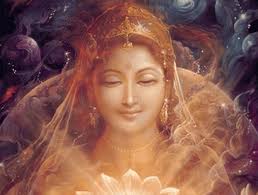 Sages for millennia have called the Creator, Preserver and Transformer of the world of matter (mater, Mother) the Divine Mother.
Sages for millennia have called the Creator, Preserver and Transformer of the world of matter (mater, Mother) the Divine Mother.
Here’s Lao Tzu for instance:
“Nameless indeed is the source of creation [the Father],
But things have a mother and she has a name.” (1)
And Sri Yukestwar Giri, guru of Paramahansa Yogananda:
“‘It is the Spirit of God [the Holy Spirit or Divine Mother] that actively sustains every form and force in the universe; yet he [the Father] is transcendental and aloof in the blissful uncreated void beyond the worlds of vibratory phenomena,’ Master explained.”(2)
When the Mother speaks through Linda Dillon, she identifies herself as the Mother as well. (3)
This though there is no gender at the levels of reality we’re talking about. That leads me to believe that it’s a teaching tool.
They’re represented as the exact opposite of human psychological stereotypes. In psychology, the male is seen as active and the woman as passive. In spirituality, the Heavenly Male is seen as passive and the Divine Female as active.
In Hinduism, especially, a literature has grown up that incorporates divine consorts and sacred partnerships, all deriving from the original coupleship of the Father and the Mother, the Source and the Creator.
It puts the journey of life into terms we can understand and identify with.
My vision in 1987 showed me that we’re embarked on a common journey from God the Father to God the Father. God the Mother’s material world is our school where we learn our true identity until, having seen it, we experience the moment of enlightenment that constitutes our graduation.
At that moment God meets God. God the Child, having been birthed and raised to awareness by God the Mother, reunites with God the Father, who is the All.
That, I’m told, is quite a ways down the road….
Footnotes
(1) Lao Tzu, The Way of Life. The Tao Te Ching. trans. R.B. Blakney. New York, etc.: Avon, 1975, 53.
“It began with a matrix: The world had a mother.” (Ibid., 105.)
“The formless Absolute is my Father, and God with form is my Mother.” (Kabir quoted by Paramahansa Ramakrishna in Swami Nikhilananda, trans., The Gospel of Sri Ramakrishna. New York: Ramakrishna-Vivekananda Center, 1978; c1942, 150.)
(2) Paramahansa Yogananda, quoting Sri Yukteswar Giri in Autobiography of a Yogi. Bombay: Jaico, 1975, 143.)
(3) See for instance “The Divine Mother: Your Essence is Purity,”

